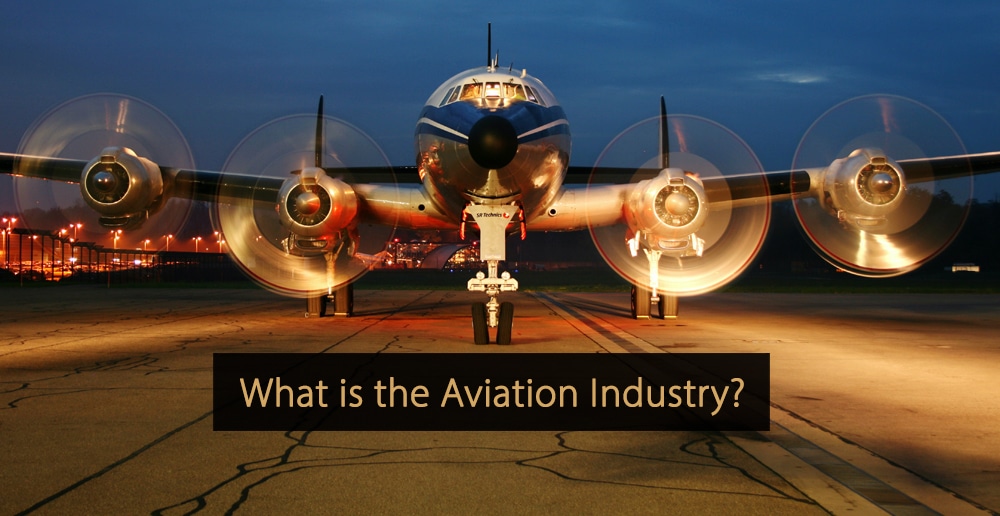Aviation management positions have much to offer, providing you with a combination of responsibility, a varied day-to-day working life, excellent employee benefits, and good pay. However, getting started in such a role can be challenging. Here, you will find a useful guide to help you begin your career as an aviation manager.
Table of Contents:
- Getting to Know the Aviation Industry
- What is Aviation Management?
- What Will You Learn With an Aviation Management Degree?
- Bachelor’s Degree vs. MBA in Aviation Management
- Benefits of Working in the Aviation Management Sector
- Overview of Different Positions Within the Aviation Management Sector
- Video: What is Aviation Management?
- Finished With Your Aviation Management Degree? Websites to Find a Job in Aviation
- Recruitment Agencies for Finding Aviation Management Jobs
- What an Aviation Manager Does & Tips for Finding a Job
- Overview of Aerospace Companies to Activate Your Career
- Aviation Course: Kick-Start Your Aviation Management Career
Getting to Know the Aviation Industry
Before starting work within aviation management, you should learn as much as you possibly can about the aviation industry, from how it is defined and relates to the airline industry to who the main employers are, how they operate, and the differences between civil and military aviation.
The “Aviation Industry: All You Need to Know About the Aviation Sector” article provides all this information and much more, helping you understand the aviation industry before starting your new job entirely.
What is Aviation Management?
As a concept, aviation management covers several different areas because the aviation industry is multifaceted. For example, airline management falls under the umbrella of aviation management. Still, so too does the management of an aircraft manufacturing business, an airport, an air cargo company, and various other related organizations.
With that being said, all aviation management roles do share similarities, and many academic institutions offer aviation management courses, teaching comprehensive aviation-related skills and knowledge. Ultimately, all aviation management positions involve overseeing the core operations of an organization specializing in aviation products, services, or offerings.
What Will You Learn With an Aviation Management Degree?
Aviation management courses are specialized business management courses that place a focus on aviation, including the airline industry, the aerospace industry, and more. They will typically aim to teach students both broad and non-specific management skills, as well as management skills that are specifically related to aviation.
The industry encompasses many different elements, so these courses help you establish a broad understanding of the sector and its strategies. Upon completion, you should have the technical knowledge and the skills to succeed in an aviation career and advance toward an aviation management role or a similar leadership position.
Bachelor’s Degree vs. MBA in Aviation Management
When obtaining a degree in aviation management, your main option is a Bachelor’s degree. However, if you then wish to take your education further, you may also opt to obtain a Master’s degree too.
Bachelor’s Degree
A Bachelor’s degree in aviation management will usually last three or four years, and the specific entry requirements for the course tend to vary from one university to another. However, due to the nature of these courses, students will typically need to be strong in areas like mathematics, science, IT, business studies, and/or law.
In almost all cases, such a course aims to equip students with a comprehensive knowledge of the aviation industry and critical management concepts. With this in mind, courses will typically provide plenty of background information on airlines, aircraft manufacturers, airports, and aviation authorities, and they will also cover various aspects of management, including marketing, accounting, finance management, business communication, sales, and more.
Most Bachelor’s degrees will primarily be earned through classroom-style teaching. Still, some may also include work placements with employers in the aviation industry, allowing you to gain relevant work experience in the process.
Master’s Degree (MBA)
A Master’s degree in aviation management will usually take the form of an MBA (Master of Business Administration) and represent a step up from a Bachelor’s degree. For this reason, many MBAs will require students to possess a Bachelor’s degree in aviation management or a similar field, although there are some exceptions.
The course will usually go into much more depth about the various sub-sectors within the aviation industry. It will expand upon the business management practices covered in a Bachelor’s degree course.
In many cases, an MBA course will also allow students to focus on specific areas of aviation, covering those in more detail. Examples of possible focus areas include airport management, airline management, air transport management, and air cargo management. Again, courses are usually classroom-based but may include work placements.
Benefits of Working in the Aviation Management Sector
Working within the field of aviation has several significant benefits or advantages, including the following:
Career Development
When you begin your first aviation management role, you will likely receive significant management training, which will help you develop skills that can be used for the remainder of your career. However, your career development will not end there. As a manager, you are likely to be among the first to learn how to use new technology, and you may be able to gain industry qualifications. You will also encounter opportunities to attend workshops, conferences, and other similar events.
International Career
Another significant benefit of aviation management as a career choice is its international nature. Not only is there the potential for travel within the role itself, the nature of the aviation industry means the skills and knowledge are transferable to other locations. As a result, people working in managerial positions often find themselves attracting interest from different organizations, which can help make opportunities to work abroad fairly common.
Meet New People & Work Within Different Cultures
One of the elements of aviation management that is sometimes overlooked is the social aspect of the role. As an aviation manager, you will meet a vast number of different people, with these potentially including travelers, clients, your employees, business partners, and other aviation managers. You also have the potential to work within various cultures, meaning your career will continuously throw up new and exciting situations.
Travel & Holiday Benefits
Finally, most aviation management jobs will provide significant travel and holiday-related benefits. For instance, most airlines offer managers substantial discounts on flights; some may even offer a certain number of free flights. However, the benefits often extend beyond this to include discounts on things like car rentals, train tickets, and hotel stays, meaning you are likely to have the opportunity to travel and also save money at the same time
Overview of Different Positions Within the Aviation Management Sector
When working in aviation management, you will be responsible for overseeing or supervising operations, which will mean working with all the different departments. As a result, it is essential to understand what the leading aviation industry roles are and what people working in those jobs do.
Check out the article “Aviation Careers: An Overview of Different Aviation Positions” for much more on the different aviation career paths available, complete with descriptions of all the primary jobs.
Video: What is Aviation Management?
Within this video, professionals from the aviation industry explain what aviation management is.
Finished With Your Aviation Management Degree? Websites to Find a Job in Aviation
Once you have completed your aviation management course, you will want to get your foot in the door, which means going through the job search process. However, the good news is that some different websites and online channels can help you find a suitable vacancy and apply for it.
Read “Aviation Jobs: Overview of Websites to Find Aviation Vacancies” for a breakdown of the main options here, including company websites, aviation job boards, relevant recruitment agency websites, and social media.
Recruitment Agencies for Finding Aviation Management Jobs
Although there are a variety of options for actually finding work within the field of aviation management, recruitment agencies offer one of the most effective routes. After all, many of these agencies have worked with specific employers for years, and they can help you to improve your application, knowing precisely what those employers are looking for.
Look at “Recruitment Agencies for Finding Aviation Management Jobs“, where you will learn more about the benefits of recruitment agencies and read through a list of some of the specific agencies to focus your efforts on.
What an Aviation Manager Does & Tips for Finding a Job
Before applying for an aviation management course, it may be useful to learn more about what someone working in this role does, their primary duties, and what skills and qualities they are required to possess. Additionally, once you have completed your course, you may need some tips for finding work.
Take a look at our “Aviation Manager Job Description & Tips to Find The Job!” article to learn all you need to know.
Overview of Aerospace Companies to Activate Your Career
Once you have achieved the qualifications and feel ready to move into aviation management, you need to find an employer to work for. Aerospace manufacturers are among the most significant aviation industry employers, and getting to know more about some of the biggest companies in this space can be advantageous.
Read “Aerospace Companies: List of Aircraft and Spacecraft Manufacturers”, and you can access a directory of the biggest aerospace manufacturers in the industry, complete with background information about each of these companies.
Aviation Course: Kick-Start Your Aviation Management Career
Aviation management roles tend to require a high level of industry knowledge and specific skills, so completing a relevant aviation course may be advisable or even necessary. It is possible to obtain qualifications in various areas, including airline management, airport management, aircraft maintenance management, and more.
To learn more about the various available courses, what they cover, and the educators that offer them, read the “Aviation Course: A Comprehensive List of Courses & Aviation Educators” article.
Aviation management can be a robust career to start because you will need significant industry experience and the right skills, qualities, and knowledge. Fortunately, obtaining a relevant degree can significantly boost your prospects.
Want to Learn More About Management in Related Industries?
All hospitality, travel, and tourism-related industries have commonalities; however, specific unique factors influence management in each industry. You can learn more about management within related industries in the following articles.
- Hotel Management: Everything You Need to Know About Managing a Hotel
- Hospitality Management: The Essentials About Hospitality
- Tourism Management: All You Need to Know About Tourism
- Revenue Management; clearly explained!
- Restaurant Management: Everything You Need to Know
- What is Travel Management?
- Destination Management: How Tourism Adds Value to Your Destination
More Tips to Grow Your Business
Revfine.com is the leading knowledge platform for the hospitality and travel industry. Professionals use our insights, strategies, and actionable tips to get inspired, optimize revenue, innovate processes, and improve customer experience.Explore expert advice on management, marketing, revenue management, operations, software, and technology in our dedicated Hotel, Hospitality, and Travel & Tourism categories.
This article is written by:
Hi, I am Martijn Barten, founder of Revfine.com. With 20 years of experience in the hospitality industry, I specialize in optimizing revenue by combining revenue management with marketing strategies. I have successfully developed, implemented, and managed revenue management and marketing strategies for individual properties and multi-property portfolios.









Thank you for giving information about aviation Management (courses) and the benefits of working in the aviation management sector.
Thank you for all the meaningful information about aviation management. It’s helpful for me and other people to find a career in aviation. Thanks again.
Thank you for the information about aviation management. It is very helpful.
Very good information about aviation management. I have one question, what degrees or courses are there available?
Hi Arham, Thank you for the compliment. More information about aviation courses you can find in the article “Aviation Course: A Comprehensive List of Courses & Aviation Educators”. Hope that helps.
This article was very helpful for me. But I am looking for an MBA in Aviation Management in Europe. Could you list some good countries popular for this course?
Thank you for your compliment and feedback. In the article “Aviation Course: A Comprehensive List of Courses & Aviation Educators” we piled up a list of popular aviation courses including a list of educators per continent. Hope this helps.
Thank you for sharing this information about aviation management. I am interested in a career in aviation. This information is very helpful to me, thanks.
Thank u for the information. Could you please suggest to me some colleges in India for BBA in aviation as well as MBA in aviation management?
Hi Sarwah, the article “Aviation Course: A Comprehensive List of Courses & Aviation Educators” might help you.
Nice blog with good information about aviation management. Well done and thank you for sharing this knowledge.
Very informative blog about aviation!
Thank you so much for providing guidance regarding aviation management. You explained all information in a very easy way, so a person new to the industry, also understands and takes benefit of this blog.
Thanks for providing us with this type of Guidance to us.
This blog is very useful to us. It gives a lot of information about aviation management, including airline courses.
Thank you again for this very informative and detailed aviation management guide. Very valuable for a lot of people. Thanks again for sharing this article.
Thank you for the information in this article about aviation management.
The mosaic of human understanding is formed by the countless valuable insights we share :) Thank you, Revfine.com.
I enjoyed this article about aviation management. Very informational.